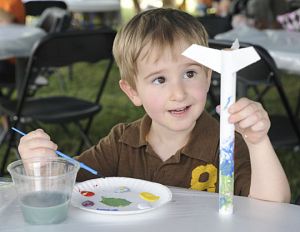

Simeon Castonguay was among 200-plus kids who painted rockets at Porterfield Square (Barter Green). Photo by David Crigger/Bristol Herald Courier
** This story appeared in Bristol Herald Courier on Wed, June 16. **
ABINGDON, Va. – Many a child has built a rocket in the backyard – using a cardboard tube, perhaps, propelled by a vinegar-and-baking soda solution.
Not many have built one alongside NASA engineers and an astronaut.
Children of all ages turned out Tuesday afternoon at the Porterfield Square for Barter Theatre's free rocket-building workshop, held in conjunction with Astronaut Week and the world premiere of Barter's new play, "The Blue-Sky Boys."
Former senator and astronaut Harrison "Jack" Schmitt – credited as the last man to step foot on the moon, in the 1972 Apollo 17 mission – was on hand with former NASA engineers Jim Long, Gary Woods and Dick Church to provide counsel and encouragement to the budding rocket engineers.
"Back in [the late 1950s] a group of people got interested in rockets, and that's how we got to the moon," Schmitt said. "It's a great thing – to keep [children] excited about new things in math and science."
Five-year-old Ella Coburn, of Glade Springs, painted her rocket with silver stars. Her father, Lee Coburn of Coburn Creative, made the rocket on the play's poster, and she wanted to make one too, said her mother, Melissa Dickenson.
"She said she was going to go home and put it next to his," Dickenson said of Ella's rocket.
A few seats down, Abingdon native Ashley Mullins, 9, was painting "USA" on the side of her rocket.
"I'm trying to make it look like a real rocket," she said.
She plans to return Saturday for the rocket launch the theater will host at Latture field.
One child, 5-year-old Jack Formato, was dressed as an astronaut.
"It was his Halloween costume," said his mother, Lori Formato, of Wytheville. "When I found out about this [event], it was the perfect opportunity. I didn't realize it would be such a hit."
The rocket building workshop ties directly into the type of creative thinking that engineers in the play used, said Peter Yonka, the theater's director of marketing.
" "The Blue-Sky Boys' is all about using creativity to solve real-world problems, that you think would involve just math or just logic," Yonka said. "[The children] get to paint or design under a theme that inspires them."
Christine Webb, the theater's communication manager, said that in the play, NASA engineers find their inspiration from historical and mythical characters.
"[This event] let kids find out who inspires them," she said. "It's good to see all the kids being creative."
"The Blue-Sky Boys" playwright Deborah Brevoort also was on hand to help the young rocket engineers.
She said it was a "stroke of genius" that the event organizers planned the workshop to "get kids – and adults – excited about space."
"I've been hanging out with three of the engineers, and the play is about them, so it's thrilling for me," she said.
Richard Rose, Barter Theatre's Producing Artistic Director, said the Astronaut Week events were "kind of a natural fit" for the launch of the play.
"It's very rare for the general public to have access like this," he said. "Twelve men walked on the moon, and only nine are alive."
Earlier in the day, Schmitt spoke to an audience over lunch about his mission and his belief that humans should make another effort to go to the moon.
"It is hard to imagine how much of an influence ... the launch of Sputnik had," Schmitt said. "The U.S. had the capability - and indeed the world had the capability - to do almost anything in space. U.S. pride and confidence was enhanced during that period."
He said he supports putting man back on the moon because "humans bring the brain."
The brain is a "semi-quantitative super computer with about 3.8 billion years of technical evolution," he said. He said also that the human eye and hand could not be replicated or replaced by robot technology.
Returning to the moon would continue "at least 50,000 years of human exploration," he said. "If we abandon space, it will be equivalent to previous civilizations abandoning the oceans."
He said he disapproves of the current administration's mission to explore asteroids.
"The moon has so much more to offer and is so much easier to get to," he said. "The moon gives you a much better staging area [for a mission to Mars] than an asteroid. I don't think [the administration] recognizes, or wants to recognize, how important space exploration is for the future."
Schmitt is on hand for other events this week, including the premiere of "The Blue-Sky Boys" at the Barter Theatre on Friday, a special family-oriented lecture tonight, and golf at The Virginian on Thursday.